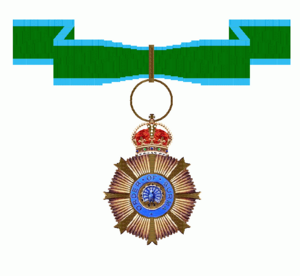Order of Burma facts for kids
Quick facts for kids Order of Burma |
|
|---|---|

Badge of the order
|
|
| Type | Colonial order |
| Established | 10 May 1940 |
| Country | |
| Awarded for | Long, faithful and honourable service, and later gallantry, by members of the armed forces in Burma |
| Status | Dormant order |
| Grades | Member (OB) |
| Statistics | |
| Total inductees | 33 |
Ribbon of the Order |
|
The Order of Burma was a special award created in 1940. It was given to people in Burma who served the British government for a long time. This award was for their loyalty and bravery. It was like a medal of honor for soldiers and police officers in Burma.
The award was created when Burma was part of the British Empire. It was a way to recognize the important work of local officers.
Contents
What Was the Order of Burma?
The Order of Burma was started on May 10, 1940. It was created by a special official document called a Royal Warrant. This order had only one level of award. It was given out by the Governor of British Burma.
Who Received the Award?
The award was for officers in the Burma Army. It also went to those in the Burma Frontier Force and the Burma Military Police. These were local Burmese officers. At first, it was for long and loyal service. Later, in September 1945, it could also be given for acts of bravery.
Why Was the Order Created?
Before 1937, Burmese officers could receive the Order of British India. But in 1937, Burma became a separate colony from British India. This meant Burmese officers could no longer get the old award. So, the Order of Burma was created to replace it. It was given for similar reasons.
How Many Awards Were Given?
When the Order of Burma first started, there were 28 awards available. Sixteen were for the Burma Army. Twelve were for the Burma Frontier Force and Military Police. New awards were given out once a year as spots became open.
Benefits of the Award
People who received the award also got a small payment. They received one rupee every day for the rest of their lives. This payment would stop only if they did something wrong.
Recipients could also use the letters "OB" after their name. This showed they were members of the Order of Burma. Only 33 people ever received this special award.
What Did the Badge Look Like?
The badge of the Order of Burma was very detailed. It was a gold circle with rays coming out, like the sun. It was about 39 millimeters (1.5 inches) wide. On top of the circle was a crown, showing it was a royal award.
Design of the Badge
In the middle of the badge was a round part. It showed a peacock with its tail spread out. Around the peacock, it said 'ORDER OF BURMA'. The badge was worn around the neck. It hung from a ribbon that was dark green with light blue edges.
End of the Order
After Burma became an independent country, the Order of Burma was replaced. On September 2, 1948, the new government created its own award. It was called the Pyidaungsu Sithu Thingaha. This new order took the place of the Order of Burma.

